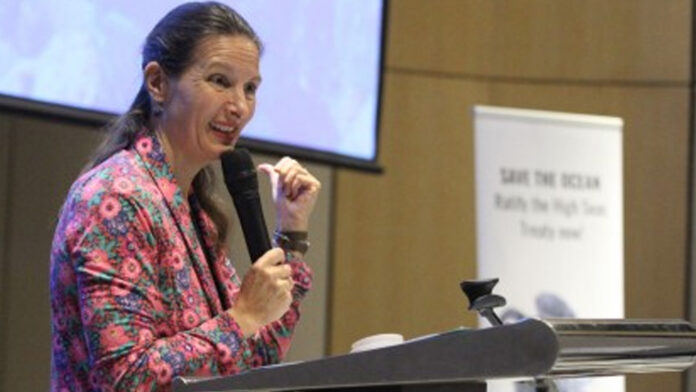The early ratification of a United Nations treaty that aims to protect the high seas would politically boost the Philippines’ position regionally and globally, France’s envoy and international organization High Seas Alliance (HAS) said Wednesday.
In a high-level legislative forum in Pasay City, French Ambassador to the Philippines Marie Fontanel expressed hope that Manila would be among the first 60 states to ratify the landmark Biodiversity Beyond National Jurisdiction (BBNJ) Agreement, also known as the UN High Seas Treaty.
“I’m sure that the Philippines will ratify, it’s just a question of time,” she told reporters.
“But indeed, if we reach 60 ratifications without you in Nice, France, and the treaty will enter into force soon, we don’t want you to be next and not participate in the very first discussions.”
The envoy said the Philippines, as an archipelagic state highly exposed to natural disasters, is “qualified to speak” on the protection of oceans, much more than many other countries.”
Ratifying the treaty early, she said, would also show Manila is continuing on the path of “making international law more and more protective to the oceans.”
Likewise, HAS Asia Regional Coordinator Rizza Sacra-Dejucos said becoming one of the first 60 to ratify the accord would send a “strong signal” that Manila is serious in its commitment to protect 30 percent of Earth’s land and ocean by 2030.
“By ratifying the treaty, the Philippines will reaffirm its leadership in marine conservation, strengthen regional cooperation, and gain access to new scientific, technological, and financial resources,” she said.
”This will ensure that the Philippines has a voice in shaping the future of global ocean governance, impacting the generations to come.”
France is set to host the highly-anticipated 2025 UN Ocean Conference in Nice from June 9 to 13.
For months, Fontanel said Paris had actively engaged foreign partners to reach 60 ratifications by the time the conference takes place.
“We see that now, 30 countries are really about to ratify,” she said.
To date, 22 countries out of the 104 that signed the document have ratified the treaty.
The BBNJ agreement is the first legally binding international accord dedicated to the conservation and sustainable use of marine biological diversity in the high seas.
HAS said these areas have long suffered from “fragmented management and a lack of coordinated regulations,” making them susceptible to overexploitation, pollution, and the escalating threats posed by climate change.
The treaty aims to tackle these issues by establishing a framework for creating marine protected areas, conducting environmental impact assessments, and ensuring a fair sharing of benefits from marine genetic resources.
Last month, the Department of Foreign Affairs (DFA) said the Philippines is committed to ratifying the accord early.
The agreement is currently undergoing the concurrence process of the Philippine Senate, after which the country’s instrument of ratification can be deposited with the UN. (PNA)






